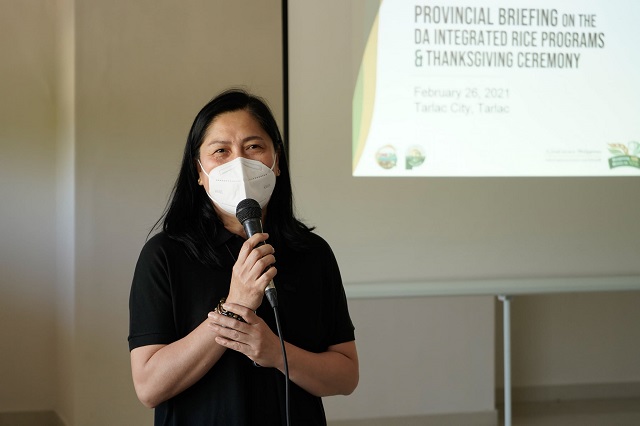
Dr. Alicia Cruz, Tarlac provincial agriculturist, thanks RCEF for its significant contribution to the increased yield and improved access to certified inbred seeds of Tarlac farmers.
The provincial local government unit of Tarlac expressed their satisfaction with the implementation of the Rice Competitiveness Enhancement Fund (RCEF)-Seed Program for three consecutive seasons.
During the recent briefing on the Department of Agriculture (DA) integrated rice programs conducted in the province, Dr. Alicia Cruz, provincial agriculturist said the program has significantly contributed to the increased yield and improved access to certified inbred seeds of rice farmers in Tarlac, from Sept. 2019 to March 2020.
“Our province has more than 75,000 rice farmers. This is the first time that we were able to distribute seeds to all of them, which were provided by the program before every planting season,” she said.
Tarlac received and distributed 196,290 bags of certified inbred seeds for dry and wet season 2020, and dry season 2021 from RCEF. They reported 100% distribution to farmers through the RCEF Seed Monitoring System.
Aside from the seed delivery and distribution activities, the province also conducted PalaySikatan in select farmers’ sites. This is a technology demonstration activity featuring modern rice varieties and technologies, with farmers as the key implementers. Tarlac was also one of the pilot areas of the Binhi e-Padala, a digital technology-aided seed distribution.
Cruz also reported that the average yield of rice farmers in the province has increased from 5.2t/ha in 2019 to 5.48t/ha in 2020. She noted that the certified seeds received from RCEF contributed to increased rice yield.
Meanwhile, the local government unit of Tarlac is also hopeful that the integration of the rice programs of the Department of Agriculture will advance the province’s good standing on rice production.
“The new program arrangement aims to enhance efficiency of government programs on rice, at the same time, avoid duplication of interventions. Starting wet season 2021 the RCEF-Seed Program will operate on 42 provinces while the National Rice Program will focus on 15 provinces,” Dr. Flordeliza Bordey, head of the RCEF Program Management Office and deputy executive director of the DA-Philippine Rice Research Institute, said during the provincial briefing.
Tarlac started to receive its share of hybrid and inbred seeds, and other farm inputs from the National Rice Program in March this year.
The RCEF-Seed Program is a component of Republic Act 11203 or Rice Tariffication Law signed by Pres. Rodrigo Duterte, which allots P10 billion fund every year for the rice farmers. Sponsored by Sen. Cynthia Villar, the program is a six-year government initiative to help the farmers compete in the international rice market. The local government units and lawmakers assist in its implementation.
PhilRice leads the RCEF-Seed Program, and is the government’s lead agency on rice research and development mandated to help ensure a rice-secure Philippines. With eight stations across the country, its programs and projects are in line with the DA’s “Masaganang Ani, Mataas na Kita” battle cry. For more information about the Institute’s program, queries can be sent thru PhilRice Text Center (0917 111 7423) or email prri.mail@philrice.gov.ph.




